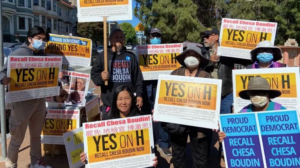
Another Tuesday, another Election Day, another recap of the most intriguing contests.
The most high-profile race, of course, is one that is yet to be resolved. As expected, Karen Bass and Rick Caruso are set to battle for the Mayoralty of Los Angeles on November 8th.
Despite only having the results from about 35% of precincts, it’s clear neither Bass nor Caruso will reach 50%. At the moment, Caruso has the advantage with 42.1% to Bass’ 37.0%.
With inconclusive results in Los Angeles, the nation’s eyes turned to San Francisco, where District Attorney Chesa Boudin was recalled. With 61% of precincts in, 60% of voters supported the recall against just 40% that opposed it.
Boudin’s defeat is already being portrayed as a major loss for liberals and a victory for the backlash against progressive prosecutors in America’s major cities. After all, Boudin has an almost comical far left-wing background as the son of two former Weather Underground radicals.
Yet such a conclusion neglects evidence from other recent elections.
For instance, in Des Moines a progressive won the Democratic primary for Polk County Prosecutor. Furthermore, last November Philadelphia District Attorney Larry Krasner won re-election despite fierce opposition from the city’s police union.
What made San Francisco unique is the outrage citizens of Chinese and Filipino descent felt towards Boudin. They believe that the recent rise in hate crimes towards Asian-Americans was being effectively ignored by the DA. Similar concerns led to the ouster of three members of the San Francisco School Board last February as well.
Such results suggest that the city’s growing Asian-American community doesn’t feel adequately represented by their elected officials. I’d bet that in the coming years we’ll see more diverse candidates in San Francisco and other areas across the nation with large Asian-American populations.
Nevertheless, there are clear signs that a rise in homelessness and prominent violent incidents are causing anxiety over crime in general to skyrocket across the nation. In this case, the perception is much more powerful than the reality. So as long as this phenomenon continues, it’ll be a major factor in any and every U.S. political contest.
Finkenauer Upset in Iowa
In 2018, Abby Finkenauer’s political future couldn’t be brighter. The 30 year-old had just been elected to the U.S. House and was just the sort of young blood the Democratic Party was looking for to compete again in the Hawkeye State.
It’s fair to say the past few years haven’t gone the way she must’ve imagined they would.
First, Finkenauer narrowly lost her re-election effort in 2020. Even so, she was still well-positioned to secure a position in the new Biden Administration. After all, Finkenauer was one of the few Iowans to endorse Biden before his disappointing showing in the caucuses. At one point, she was even mentioned as a possible Labor Secretary.
That cabinet appointment fell through, of course, and Finkenauer chose to run for Senate in 2022 instead. Perhaps she was hoping that 88 year-old Chuck Grassley would pass on another term and leave behind an open seat. Not only did Grassley announce his intention to run for re-election, though, but Finkenauer wasn’t able to even clear the Democratic field.
Retired Navy Admiral and 2020 Senate candidate Michael Franken ran against Finkenauer and managed to outspend her on the airwaves and the web. According to Franken’s internal polls, this onslaught erased a 27-point deficit and put him ahead by two points in the campaign’s final days. The fact that Finkenauer nearly failed to secure enough petitions to make the ballot also suggests she suffered from major structural issues within her own campaign.
Ultimately when the dust settled, Franken easily defeated Finkenauer 55% to 40%.
Now, Finkenauer will have to hope that this time she can manage to snag a White House job. Perhaps there’ll be enough vacancies after the midterms elections to ensure her a spot.
The New January 6th Litmus Test?
Back in 2020, Congressman Michael Guest received nearly 90% of the vote in his Republican primary. This time, though, he’s headed for a June 28th run-off. What happened?
Well, Rep. Guest was one of 35 Republicans who voted to approve the January 6th Commission. As a result, Navy pilot Michael Cassidy could run to Guest’s right.
With 94% of precincts in, Cassidy is edging out Guest 47.42% to 46.98%. Since neither candidate reached the 50% threshold, they’ll face off again three weeks from now.
Another GOP Rep. who voted for the Commission, South Dakota’s Dusty Johnson, was able to win his primary, although not without a fight. Johnson secured 59% against his opponent Taffy Howard’s 41%, a significant regression from his 77% to 23% primary win back in 2020.
Finally, we’ll conclude with a test of Donald Trump’s strength out in Montana. The former President was backing his former Interior Secretary Ryan Zinke for the new 1st Congressional District. Zinke, a former Congressman who had to resign from Trump’s Cabinet in 2018, apparently had a bit of trouble convincing his fellow Montanians to take him back.
With about 88% of precincts in, it’s still unclear who will win the GOP primary. Zinke is in the lead with 32,752 votes (41.4%) yet former State Senator Al Olszewski is right behind with 31,688 votes (40.0%).
Next week, we’re set for primary contests in Maine, North Dakota, Nevada and South Carolina. I’ll be back again to recap all the noteworthy results in those states.